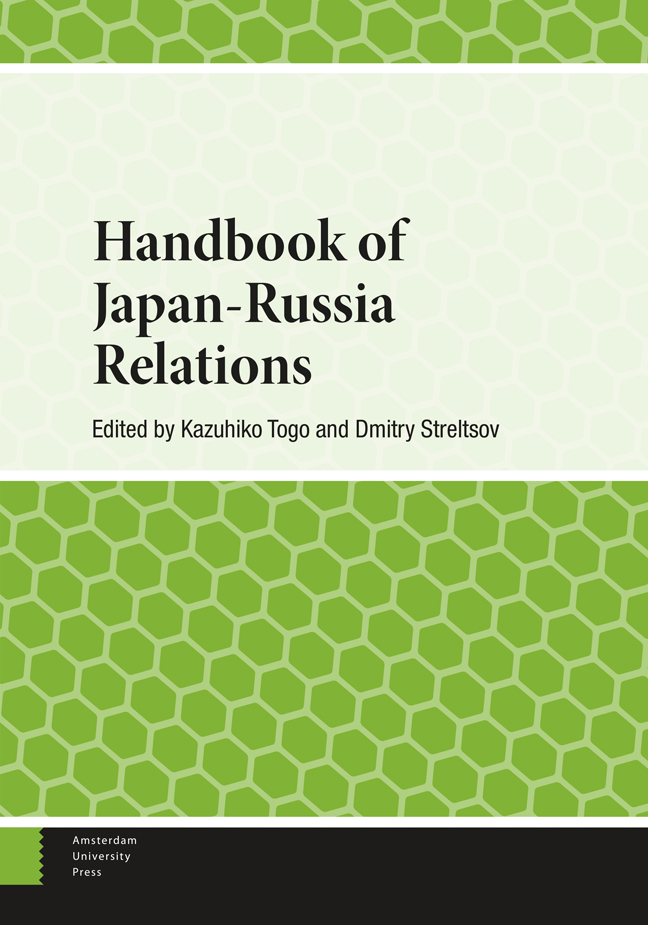Book contents
- Frontmatter
- Contents
- Dedication
- Acknowledgements
- Contributors
- Abbreviations
- Introduction
- Part 1 War and Peace: Diplomatic Relations and Security
- Part 2 Territory
- Part 3 The Economy and Energy
- Part 4 Disaster Cooperation
- Part 5 Culture
- Part 6 Perceptions of the Other
- Appendix 1 1956 Joint Declaration
- Appendix 2 Tokyo Declaration (1993)
- Appendix 3 Moscow Declaration (1998)
- Appendix 4 Irkutsk Statement (2001)
- Appendix 5 Foreign Ministry Statement (2022)
- Index
8 - Japan-Russia Trade and Economic Relations: The Japanese Perspective
Published online by Cambridge University Press: 26 March 2024
- Frontmatter
- Contents
- Dedication
- Acknowledgements
- Contributors
- Abbreviations
- Introduction
- Part 1 War and Peace: Diplomatic Relations and Security
- Part 2 Territory
- Part 3 The Economy and Energy
- Part 4 Disaster Cooperation
- Part 5 Culture
- Part 6 Perceptions of the Other
- Appendix 1 1956 Joint Declaration
- Appendix 2 Tokyo Declaration (1993)
- Appendix 3 Moscow Declaration (1998)
- Appendix 4 Irkutsk Statement (2001)
- Appendix 5 Foreign Ministry Statement (2022)
- Index
Summary
In the 2000s, Japan-Russia economic relations developed rapidly, aided by rising oil prices, which increased Russia’s exports of oil and gas to Japan and Russia’s imports of passenger cars from Japan. Since the most competitive sector in Japan is the automobile sector and the corresponding sector for Russia is the oil and gas sector, mutual trade between the two countries followed this competitiveness in the next decade as well. The trade volume, however, fluctuated depending on oil prices and Russia’s imports of passenger cars decreased due to stagnant economic growth since 2009. Japan’s FDI in Russia has largely been driven by oil and gas development and the car industry as well.
Introduction
This chapter argues that Japan-Russia relations have been developed through economic rather than political factors. These relations have been largely based on comparative advantages of the two countries, especially since the beginning of this century. Some have argued that if the so-called Northern Territorial Issue is resolved, Japanese-Russian economic relations will make rapid progress. Its contraposition is that if these bilateral economic relations do not develop rapidly, the territorial issue will not be resolved. However, I think that this proposition is a complete myth.
In the 1990s, after the collapse of the USSR and the ensuing political and economic turmoil in Russia, Japan-Russia economic relations did not improve much. Only in the 2000s, when the Russian economy began to grow rapidly due to rising oil prices, did bilateral trade relations enter a new stage of development. We can say that there was a boom in these relations in the period 2003–2008, when the volume of bilateral trade increased by 20–60 percent every year (Figure 8.1). In particular, Japan’s exports to Russia expanded quite rapidly through automobile exports (annual rates of increase were 40–90 percent). However, due to stagnant economic growth since 2009, Russia’s imports of passenger cars have decreased considerably, resulting in stagnation of Japan’s total exports to Russia in the past decade. The corresponding increase in Japan’s imports from Russia in this century was brought about by those of oil and liquefied natural gas (LNG). Those imports had grown until 2014 after a sharp drop in 2009 and have stagnated since 2015 largely due to the decline in energy prices.
In this chapter, I analyze these bilateral relations mainly in the period after the 2010s. Concerning the previous period, refer to Tabata (2012).
- Type
- Chapter
- Information
- Handbook of Japan-Russia Relations , pp. 140 - 154Publisher: Amsterdam University PressPrint publication year: 2024



